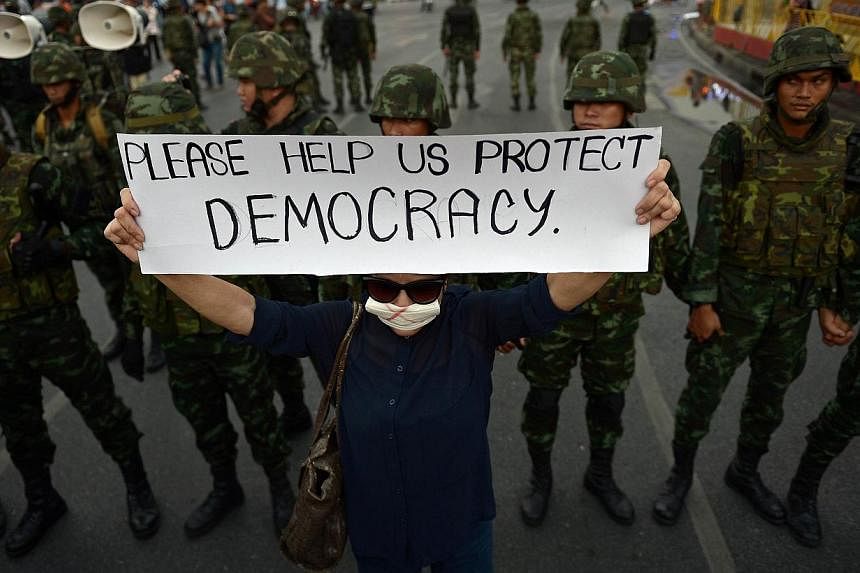EVENTS on either side of the Bay of Bengal illustrate the contrasting fortunes of democracy in Asia. Notwithstanding questions about his role in anti-Muslim violence, Mr Narendra Modi stormed to victory in India's elections. The ballots of more than 500 million electors put power in the hands of Gujarat's controversial chief minister.
Events in Thailand stand in stark contrast to this orderly transfer of power as army chief Prayuth Chan-ocha seized power in the country's 12th effective coup since 1932. So far, international reaction has generally been muted, with most states encouraging dialogue and calling on all parties to refrain from violence.
Liberal democracy has had a fragile existence in the Thai kingdom. This latest coup is the product of an increasingly divided society. Thailand's competing groups - the royalist elites in Bangkok, the poor and emerging middle classes from the rural northern provinces and the military - are unprepared to accept the terms of the democratic deal that the current Constitution delivers.
General Prayuth has assumed sweeping powers - initially without royal approval - detained key figures and suspended key freedoms. An added complication this time is the parlous health of the King. In the past he had been able to broker some kind of uneasy truce between the parties due to his standing. A protracted period of repressive military rule is a very real prospect.
How the international society responds to coups varies greatly. For example, the 1991 cancellation of the election results in Myanmar led to a military junta, which became subject to a wide array of international sanctions. Other coups have been accepted almost gratefully, most notably in Indonesia in the mid-1960s.
Democracies such as Australia and Japan have tended to exhort a speedy return of the Constitution and the rule of law while authoritarian states, such as China, have expressed their desire to see a return to "normal" order. The United States has taken the strongest symbolic steps so far. Secretary of State John Kerry announced that Washington will review its extensive military links to the kingdom.
Aseanwill remain impartial. This is not because of some kind of coup fatigue. Since its founding in 1967, non-interference in the domestic affairs of its members has been a fundamental principle of the grouping.
Beyond the organisation itself, the other nine members of the association are likely to follow this lead in public at least. Behind the scenes, however, things are rather more complex. States in South- east Asia are acutely aware of the ways in which developments in one of them can have sudden and dramatic knock-on consequences across the region. The seismic economic and political events of the 1997-98 Asian financial crisis are still etched firmly in the mind.
Within Asean, a division is growing between the more developed, globalised and liberally oriented Asean states and those that are underdeveloped and authoritarian. Indonesia and the Philippines have rather different perspectives on events in Bangkok than Vietnam and Myanmar.
A further complication is the shadow of great-power rivalry. Thailand has a longstanding close relationship with the US. With the US coming down hard on Thailand, rhetorically at least, China may see a chance to strengthen its hand in South-east Asia by providing aid and other support.
The other problem the international community faces is the rather limited menu of diplomatic options available. Economic sanctions would greatly harm Thai citizenry as well as the many foreign firms on whom the economy depends. Isolation has not proven to be an especially effective strategy.
While it appears on the surface that international reaction to the Thai coup is fairly limited, behind the scenes, there is considerable concern in regional capitals. In the past Thai coups have not lasted long, with some kind of political compromise arrived at relatively quickly. Thai watchers think that this time, things will be different, particularly given the coup's belated royal approval and the nature of the political deadlock that prompted military action.
For liberally oriented states that want Thailand to retain its ties to the US, the coup presents a conundrum. The fall of a democratically elected government is something to which one ought to respond, yet working out how to do so in ways that advance one's interest is more complex. The Asean approach of quiet diplomatic engagement is likely to prevail over the short to medium term.
The writer is executive director, La Trobe Asia at La Trobe University. This article first appeared in The Conversation (http://theconversation.com), a website which carries analysis by academics and researchers in Australia and Britain.

